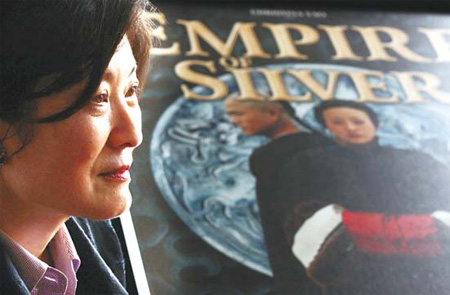A historical novel, a grand tradition and a US$10 million budget - that's what Christina Yao received when she began directing her first film "Empire of Silver" back in 2004.
|

|
|
Many props in "Empire of Silver," directed by Christina Yao, come from Shanxi's museums and private collections. [China Daily] |
The man who was footing the bill was Terry Kuo, the wealthiest man in Taiwan, who shares the same ancestral home region - Shanxi province in North China - with Yao. It is a part of China known for its centuries-long business tradition.
The novel, which now is a feature film, was "Silver Valley," a tale about Shanxi merchants, who were the earliest and most successful businessmen controlling China's trade and finance in the 19th century.
The film stars Aaron Kwok and Hao Lei and when it premiered in Taiwan the promotional slogan was: "See Empire of Silver if you want to be rich."
The film opens in cinemas on the mainland on Aug 21, and is being billed as "the Wall Street of Imperial China" in promotion trailers.
But the subject of war in business, although a relevant topic in the current economic recession, is not an issue Yao wants to explore.
Her focus, instead, is the ethics behind business.
The film is set in 1899, during late Imperial-early Republican China period when society was experiencing a transformation and traditional values were under pressure.
The family of powerful banker Kang Wunan becomes the human face of the film.
He chooses his third son to inherit his empire but the young man insists on practicing ethics in business, which conflicts with his profit-oriented doctrine.
When the bank is hit by social turmoil, the son uses the family's own savings to make up for the questionable clients, who irritates him.
"Shanxi people call themselves Confucian merchants, but the Confucianism often diverges with rules in real business. When the conflicts occur, what is the right thing to do?" Yao says.
"I have no answer, but I hope people will think about it."
Shanxi businessmen are known for their "erudition," "sense of shame" and "long legs." As early as the 19th century, their business world had extended to Singapore and Russia.
Yao spent two years searching historical records and reading books, and over nine months her team traveled across four provinces and 13 cities to shoot the film.
She was most impressed by Shanxi people's generosity and respect for tradition.
Most of the props in the film were taken from museums and private collections in Shanxi.
One of these artifacts was a precious gold clock in the shape of a locomotive. It was a gift the Empress Dowager Cixi gave the Cao family, a prominent business clan in Shanxi.
The museum usually forbids photography of this treasured piece, however, for Yao, it lent the antique for free.
The crew also borrowed furniture of the Qing Dynasty (1644-1911) from local families, who were very generous after they discovered the film was about Shanxi merchants.
"I told my prop man, these are not props, these are antiques," Yao says. "I am really thankful to them. Even when they found some actors leaned on their delicately sculpted antique furniture, they did not blame them."
Many antiques are well protected, not only in museums, but also in ordinary households.
Yao visited a peasant, who lent her a folding screen. When Yao found one corner was lost, the peasant went to his room and gave her the lost piece, carefully preserved.
Although some feel the inheritance of traditional culture is challenged today by people's obsession with making money, after five years of research and shooting, Yao is optimistic.
"When you see people's care and respect for a piece of their old furniture, you know that the traditional culture will be inherited well," she says. "And I believe even if we lose it now, it will come back one day, because it is our roots."
(China Daily August 11, 2009)